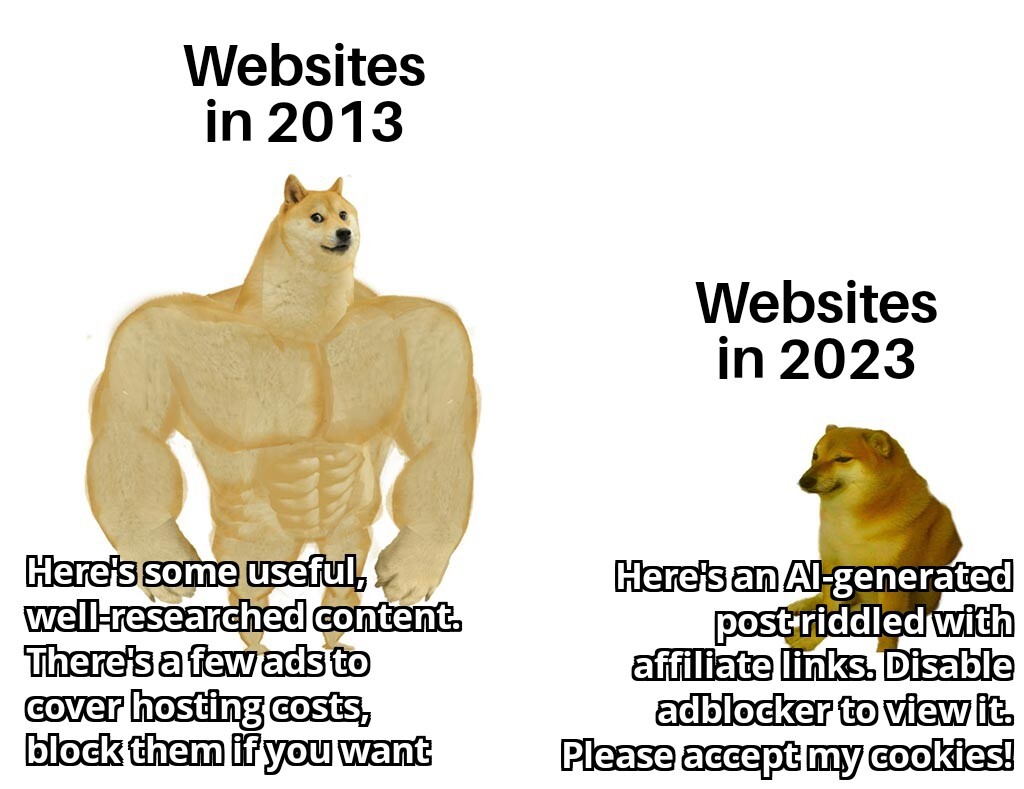this post was submitted on 15 Oct 2023
1174 points (98.2% liked)
Memes
10452 readers
1652 users here now
Post memes here.
A meme is an idea, behavior, or style that spreads by means of imitation from person to person within a culture and often carries symbolic meaning representing a particular phenomenon or theme.
An Internet meme or meme, is a cultural item that is spread via the Internet, often through social media platforms. The name is by the concept of memes proposed by Richard Dawkins in 1972. Internet memes can take various forms, such as images, videos, GIFs, and various other viral sensations.
- Wait at least 2 months before reposting
- No explicitly political content (about political figures, political events, elections and so on), !politicalmemes@lemmy.ca can be better place for that
- Use NSFW marking accordingly
Laittakaa meemejä tänne.
- Odota ainakin 2 kuukautta ennen meemin postaamista uudelleen
- Ei selkeän poliittista sisältöä (poliitikoista, poliittisista tapahtumista, vaaleista jne) parempi paikka esim. !politicalmemes@lemmy.ca
- Merkitse K18-sisältö tarpeen mukaan
founded 2 years ago
MODERATORS
you are viewing a single comment's thread
view the rest of the comments
view the rest of the comments


Interesting approach, gonna think about it. So far I didn't take disinformation as a result of news companies going broke.
Why would people forget that the BBC is more trustworthy then someones uncle, just because his opinion is for free? The distrust in "old authorities" like big newspaper or governments is, in my opinion, a long-term result of the broken promisses of the hegemony they are, or seem to be, part of.
The concept "people have to have to pay for quality information" doesn't sit right with me. Relevant info should be available for everyone! And trustworthy news orgs should be funded pubicly.
I don't think it's the only reason, but it's one of the reasons.
Part of the disinformation ecosystem is randos pumping out content so they can get ad clicks. Social media rewards that (etc), but the original sin is mixing timely investigative journalism with every other kind of free content online. It cheapens journalism.
You're right. And it's somewhat deserved. But by training us that well-researched reporting should be free, those old authorities basically poisoned the well. We generally expect news to be free now. Which makes it really hard for new outfits to get started.
Journalists need to eat. In the 1980s it seemed like almost every middle class household received a newspaper. I wasn't able to find stats, but I suspect that most households found newspapers useful and could pay for them.
If we return to a model where news isn't free, but it's really cheap, I think we'd be okay.
I'm all for public funding, but NPR didn't break Watergate, nor did CBC break the SNC-Lavelin affair. Western democracies co-evolved with a relatively adversarial private press.
We need ways for a private press to continue as we move further online. Non-profit models seem to work (at least for the Guardian), as do membership models (at least for Canadaland).